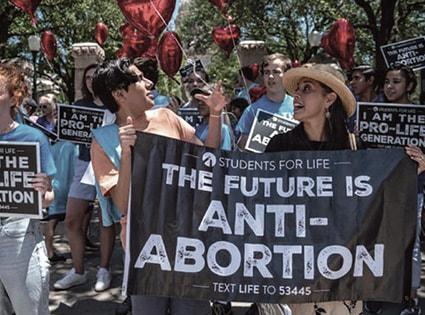What the Texas Abortion Law Really Means
Over 12 million Texan womxn woke up September 1st to the most restrictive abortion ban of their lifetimes. While American families faced evacuation and packed emergency rooms through multiple hurricanes and COVID-19 variants, Texas legislators were hard at work producing SB-8, a law criminalizing abortion at six weeks of pregnancy. Enforcement went live immediately in the form of prolifewhistleblower.com, the online platform encouraging civilians to report and prepare civil suits against anyone who undergoes or aids an abortion in the state of Texas after six weeks of pregnancy. To the dismay of womxn across the country, the United States Supreme Court set a novel precedent in deciding not to block the Texas bill.
Restricting abortion access to the first six weeks creates deliberate barriers to those seeking to terminate an unplanned pregnancy. Six weeks of pregnancy translates to two weeks after a person’s first missed period, providing an approximate two-week window to confirm said pregnancy, plan, schedule, and undergo a safe procedure. Minors will be expected to provide written consent from a parent or legal guardian within this same time frame. Most unplanned pregnancies, however, won’t be discovered within those six weeks; many won’t even experience symptoms until at least weeks seven or eight. This legislation relies on simple, predictable menstrual cycles to offer women choice, but conveniently ignores that between various syndromes, imbalances, and health complications ranging anywhere from stress to malnutrition, 14-25% of women of childbearing age face irregular menstruation (NICHD, 2017). Those who have the means will likely seek out abortion in another state or country upon discovering their pregnancy too late, leaving low-income womxn and minors in the margins. While resting on a dangerous ignorance of reproductive health, the most insidious aspect of the legislation is inciting civilians to think themselves ‘whistleblowers’ for any enforcement of the new abortion ban. Texas legislators facilitated the reporting of any person involved with an abortion after six weeks by opening up the website to any Texas resident or non-resident with information, putting the onus of enforcement on civilians and setting it apart from any abortion ban to date. In promising up to a $10,000 bounty per civil suit, what is already sensitive medical information to some is now weaponized as a monetary incentive for the public to intervene. Teenagers, already most vulnerable to unplanned pregnancy, are now discouraged from speaking up to staff or peers for guidance, out of fear someone will report their situation. And while the bill creates no exception for circumstances of assault and incest, survivors are expected to carry their trauma to term. Though abortion remains a point of controversy, its largely gone from a taboo subject to one of access and education. The Guttmacher Institute cites the national abortion rate has dropped by 20% between 2011 and 2017 (Guttmacher, 2019). Since decreasing the stigma around unplanned pregnancy and increasing education with widespread access to contraceptives, unplanned pregnancies are at an all-time-low since 2008 (CDC, 2021). This abortion ban in no way promotes education or public health in Texas, and instead serves as the precedent for a strategized ripple effect across all other states. Though many expected the Supreme Court to swiftly block the abortion ban, that was not the case. In writing SB-8 to center civilians as the sole enforcers for the abortion ban, it prevented the Supreme Court from challenging the bill at all. Normally, the Supreme Court would sue the state department or official(s) in charge of enforcement, which in this case, there are none. SB-8 found a loophole in court procedure, the first to succeed in a series of attacks on Roe V. Wade. In a single week since the bill’s passing, Planned Parenthood clinics in Texas filed for restraining orders and temporarily blocked lawsuits, prolifewhistleblower.com has been kicked off its host website indefinitely, and the Biden Administration is now planning to sue the state of Texas. In that same week, republicans nationwide have mobilized towards their own abortion bans, with leaders in Missouri, Pennsylvania, and Virginia praising the law and making promises to lead by Texas’ example. Unlike many states, Alaska protects abortion access in our state constitution, predating the 1973 Roe V. Wade decision. The latest attempt to criminalize abortion in the state was a 2019 bill sponsored by Rep. David Eastman, which failed in committee. All other bills restricting abortion in the state have been blocked by the Alaska Supreme Court. This didn’t stop Treg Taylor, our current (and third this year) Attorney General from co-signing in a joint lawsuit with states like Texas and Mississippi to overturn Roe V. Wade earlier this year. Since then, Governor Dunleavy and Republican state legislators have been staunch advocates of a state constitutional convention, citing a need to protect interests like the PFD. Others, like Sen. Shelley Hughes, have more explicitly cited the motivation to strip Alaska womxn of their abortion access, proposing an amendment redefining the constitution’s privacy clause to exempt abortion, thus allowing the state to restrict it. Alaskans have voted against holding a constitutional convention every decade since statehood in 1959. In 2022, our vote to deny another constitutional convention could be our last opportunity to defend the bodily rights of Alaska womxn indefinitely. |
